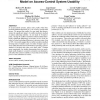Free Online Productivity Tools
i2Speak
i2Symbol
i2OCR
iTex2Img
iWeb2Print
iWeb2Shot
i2Type
iPdf2Split
iPdf2Merge
i2Bopomofo
i2Arabic
i2Style
i2Image
i2PDF
iLatex2Rtf
Sci2ools
CHI
2011
ACM
2011
ACM
More than skin deep: measuring effects of the underlying model on access-control system usability
In access-control systems, policy rules conflict when they prescribe different decisions (ALLOW or DENY) for the same access. We present the results of a user study that demonstrates the significant impact of conflict-resolution method on policy-authoring usability. In our study of 54 participants, varying the conflict-resolution method yielded statistically significant differences in accuracy in five of the six tasks we tested, including differences in accuracy rates of up to 78%. Our results suggest that a conflict-resolution method favoring rules of smaller scope over rules of larger scope is more usable than the Microsoft Windows operating system’s method of favoring deny rules over allow rules. Perhaps more importantly, our results demonstrate that even seemingly small changes to a system’s semantics can fundamentally affect the system’s usability in ways that are beyond the power of user interfaces to correct. Author Keywords access control, security, human factors ...
Access Control Systems | Accuracy Rates | CHI 2011 | Human Computer Interaction | Microsoft Windows Operating System |
| Added | 25 Aug 2011 |
| Updated | 25 Aug 2011 |
| Type | Journal |
| Year | 2011 |
| Where | CHI |
| Authors | Robert W. Reeder, Lujo Bauer, Lorrie Faith Cranor, Michael K. Reiter, Kami Vaniea |
Comments (0)

